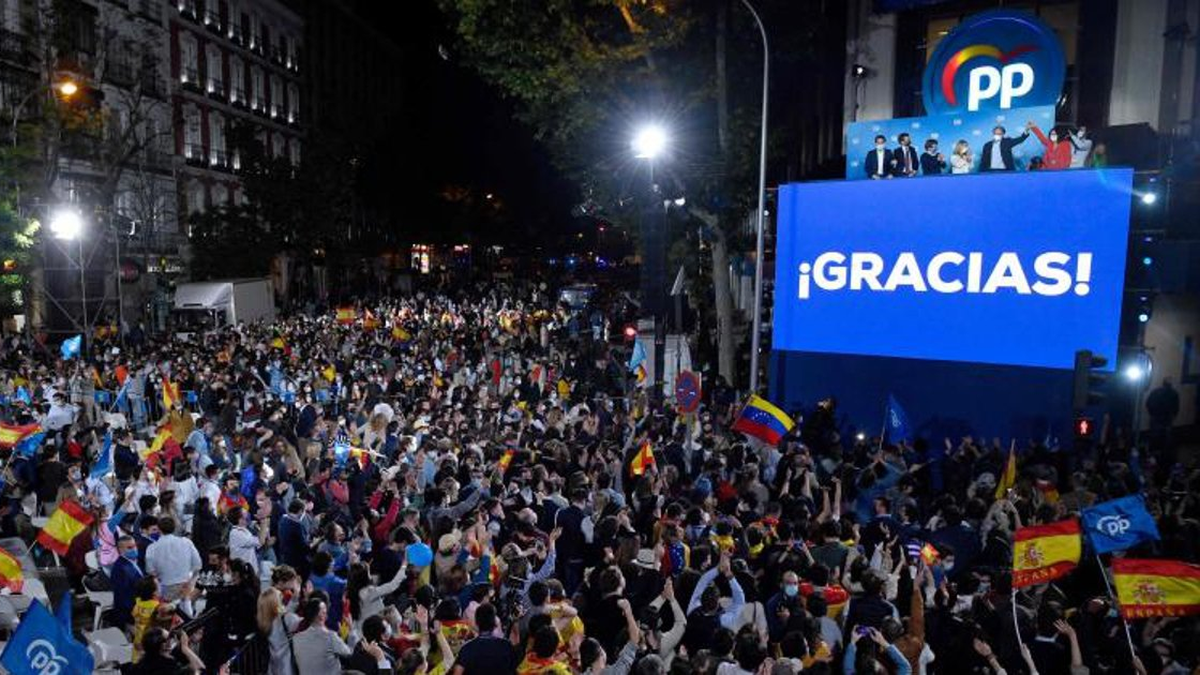Some 35.5 million people were authorized to vote in one of the thousands of voting centers, in order to renew the authorities of the municipalities and parliaments, and therefore of the governments, of 12 of the 17 regions of the country .
The PP obtained its first victory in municipal elections since 2015 and The PSOE lost 15 of the 22 provincial capitals in which it governsaccording to the Europa Press agency.
https://twitter.com/ElHuffPost/status/1662949907051708417
The main opposition party would govern six of the eight big capitals: Madrid, Malaga, Murcia, Seville, Valencia and Zaragoza.
In the first three, it will have an absolute majority where the popular do not need the far-right of Vox, although they could be forced to negotiate with Santiago Abascal’s party in some case to carry out budgets or other municipal decisions.
In the capital, the Madrid mayor José Luis Martínez Almeida became the most voted, going from 15 councilors in 2019 to 29 in 2023 (44% of the votes), and Más Madrid, a force founded by Manuela Carmena, leaves in the road to 7 councilors, remains at 12 and is no longer the list with the most votes, while Ciudadanos loses all the councilors.
The PP has guaranteed the mayoralty of Valencia where it has been the first political force. While it adds more councilors than the left-wing parties in Zaragoza. It could also stay with municipalities such as Valladolid, Toledo, Castellón, Logroño and Segovia, but they would need Vox there.
meanwhile, in Barcelona the left could be displaced, because Ada Colau was in third position and the Catalan socialists of the PSC, in second, behind the Junts candidate, Xavier Trías (11 councillors).
However, a possible pact between the PSC (10), Barcelona En Comú (9) de Colau and the five from Esquerra Republicana de Catalunya (ERC) could give the mayoralty to the left. In the spa city, the PP and Vox together reach 6 seats.
The Socialists also lose in Cádiz, where at the last minute the vote count gave a majority to the PP, and they suffer a significant punishment in Castilla y León by losing the mayoralty of Valladolid, Segovia and Burgos, provincial capitals in which they are surpassed by the sum of popular and those of Abascal.
The defeat is also severe in Castilla La Manchawhere they controlled four of the five capitals, but they will keep only one.
The only positive results for the socialists are thrown by Catalonia, where -beyond the open case of Barcelona- it manages to be the first force in Tarragona, Lleida and Girona, cities in which he did not rule and in which he could seize the baton.
In Galicia, they will be able to continue governing in La Coruna and lugo thanks to the pacts, although the PP He manages to be the first force in both. He PSOE win again in Vigo.
regional elections
As for the 12 regional elections that renewed their Parliament, 10 were led by the Socialists, either directly or in coalition.
With more than 70% of the scrutiny, the socialists lose practically all the autonomous communities and they only maintain the Principality of Asturias, where they are obliged to reach an agreement with Podemos and Izquierda Unida de Asturias (IU).
He PP It is once again the list with the most votes in the Valencian Community, the Balearic Islands, Aragon, La Rioja and Cantabria, where it will be able to govern if it reaches agreements with Vox, and also maintains the Executives of Madrid, with an absolute majority, and Murcia.
While awaiting the final results of Castile-La stain and Estremadura.
The Socialists could also revalidate Navarra, but they would need other support. In Castilla-La Mancha and Extremadura, governance is in a single seat, so both territories are awaiting the end of the scrutiny.
Prior to the elections, analysts said that if the government coalition exceeds expectations and manages to maintain control of most regions, this would indicate that the next general elections will be very close and bode well for its chances of staying in power. .
Turn to the right
As the polls predicted, there was a turn to the right, and the leader of the PP, Alberto Núñez Feijóocould “take advantage of this momentum” to come to power in the elections.
President -Head of Government- since 2018, Sánchez, from the socialist PSOE party, arrives at this electoral test with disadvantages: the erosion of power, as well as high inflation – although lower than in most European countries – and the resulting drop in purchasing power.
The President of the Government cast his vote in a school in Madrid, the capital, and then asked the public to vote “positive” because “the stronger democracy will be and the better it will be for the institutions,” he said.
Núñez Feijóo voted in another school in Madrid, called to vote “massively” and said that “complex years, difficult years” await Spain, but that the more strong governments the country has, the faster it will “get out of economic, institutional problems and social that we have”.
The image of the Government has suffered from the repeated clashes between the PSOE and its coalition partnerthe left party Can.
Núñez Feijóo has sought to present the elections as a plebiscite on Sánchez, whom he accuses of being subservient both to the left and to the pro-independence parties of the Basque Country and Catalonia, which usually support the government to approve its reforms.
On his side, Sánchez campaigned, sticking his chest out of his government’s balance sheet, especially in economic matters or in the fight against drought and water management, an increasingly central issue in Spain, a European country on the front line in the face of change climate.
The number of regions that the PP manages to wrest from the Socialists will determine whether Núñez Feijóo can affirm that he has won this first round of elections and his triumph at the end of the year is inevitable.
The main problem for the right-wing leader is that he probably needs the extreme right of Vox, the third force in the national Parliament, to form a government in some regions, and even at the national level in general.
The PP has already governed with Vox in the rural region of Castilla y León since last year, but is regularly embarrassed by the positions taken by its ultranationalist ally, especially on abortion.
Source: Ambito




